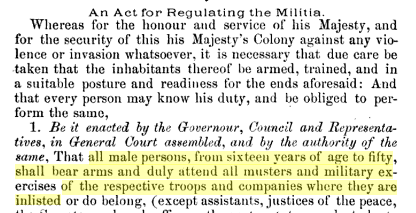An introduction and guide to my series of posts “Corpora and the Second Amendment” is available here. The corpus data that is discussed can be downloaded here. That link will take you to a shared folder in Dropbox. Important: Use the "Download" button at the top right of the screen.
New URL for COFEA and COEME: https://lawcorpus.byu.edu.
This is the first of what will be three posts on bear arms; it will be devoted to critiquing the Supreme Court’s discussion of bear arms in District of Columbia v. Heller. My examination of the corpus data on bear arms will appear in my next two posts. In the meantime, if you're interested, you can read discussions of the data by Dennis Baron (“Corpus Evidence Illuminates the Meaning of Bear Arms,” in the Hastings Constitutional Law Quarterly) and by Josh Blackman & James C. Phillips (“Corpus Linguistics and the Second Amendment,” in the Harvard Law Review Blog), both of which reach conclusions consistent with mine. (The piece by Blackman & Phillips is especially noteworthy, given that they are both gun-rights advocates.)
My focus in this post will be on the Supreme Court’s conclusion that at the time the Second Amendment was proposed and ratified, bear arms unambiguously meant ‘carry weapons, for purposes of being prepared for a confrontation,’ without regard to whether the carrying was in connection with military service. What I conclude is that even without taking account of how bear arms was actually used, the court’s arguments don’t hold up. Assuming for the sake of argument that bear arms could reasonably have been understood to mean what the court said it meant, the court didn’t show that it unambiguously meant that.
That’s not to say that I think bear arms was ambiguous. As I’ll discuss in the next two posts, the corpus evidence points toward the conclusion that bear arms unambiguously conveyed the military meaning that the Supreme Court rejected: “to serve as a soldier, do military service, fight” or “to wage war.” But even if the evidence were equivocal, the absence of evidence unambiguously supporting the court’s interpretation would still be important.
That’s because the court’s analysis in Heller depends crucially on its conclusion that bear arms was unambiguous. It was that conclusion that enabled the court to interpret the Second Amendment’s operative clause (“the right of the people to keep and bear Arms, shall not be infringed”) without taking into consideration its prefatory clause (“A well regulated Militia, being necessary to the security of a free State”). In the court’s view, if the operative clause was unambiguous, the prefatory clause “does not limit or expand [its] scope.” So if court was wrong in thinking that the operative clause was unambiguous, it was wrong in refusing to consider whether the prefatory clause affected its meaning. And if the prefatory clause plays a role in interpreting the operative clause, the argument against the court’s interpretation is strengthened.
Read the rest of this entry »

